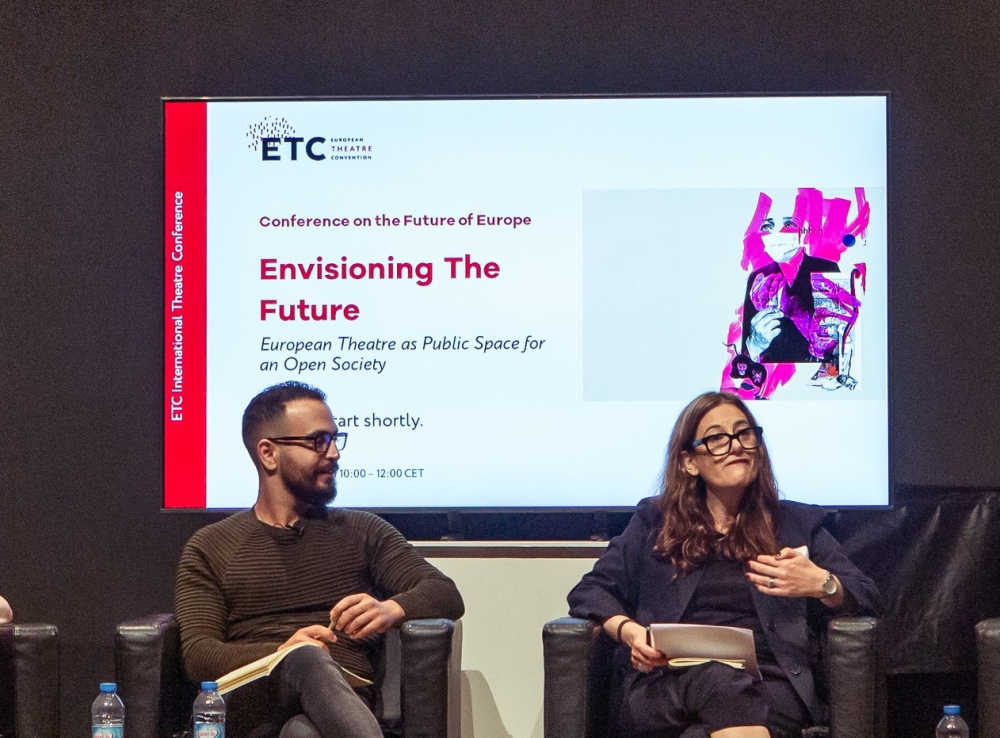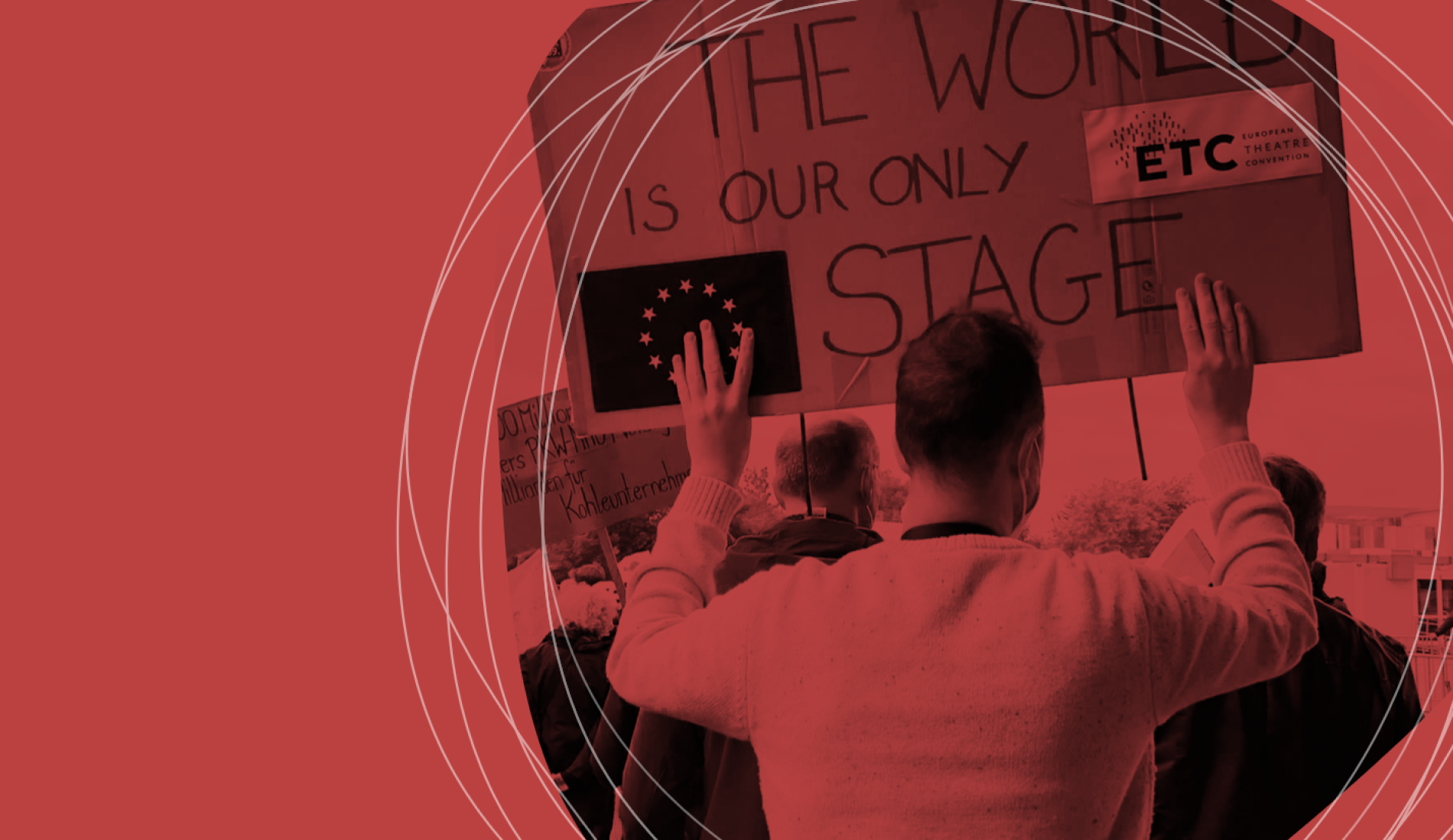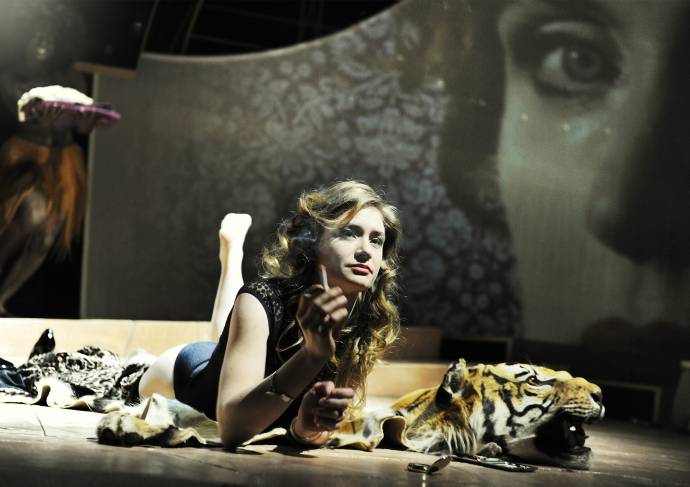Conference on the Future of Europe 2021
Conference on the Future of Europe
Envisioning the Future: Theatre as a Public Space for an Open Society
Theatre makers and young people from more than 18 European countries have a clear message to policy makers on the continent:
Act now to make sustainability, equal accessibility, participation, and freedom of artistic expression in Europe a reality!
In October 2021, the European Theatre Convention (ETC) gathered 78 theatre makers from all over Europe in Malta for debates about the kind of Europe they need, as part of a Conference on the Future of Europe event.
In his opening address of the ETC’s event, Tamás Szűcs (Director of the Culture, Creativity and Sport Directorate at the European Commission) spoke of the importance of theatre as a place to challenge and ask difficult questions, a space of dialogue where we can debate our values, a place which can help us to reflect and grow. In line with this, participants of the ETC’s two-day event consisting of balcony talks and a publicly livestreamed debate, focused on the contribution theatres can make to shaping a sustainable future – particularly in the context of the emotional and artistic legacy of the pandemic – and stressed the values and European identity of democratic theatre.
What helps to move forward, now?, the conference asked. What kind of role can we as theatre makers and as community play in forging a new future for its citizens in Europe? What did we learn during the pandemic to drive and initiate change for Europe and European theatre in the years to come? How is Covid shaping our understandings of the way we make work for diverse audiences? And why does Europe need theatres and theatrical engagement?
The policy document can be downloaded below
Conference on the Future of Europe - Reflection & Ideas for Action 2022.pdf
Downloadable PDF
DownloadAmong a diverse collection of hopes, concerns, and ambitions, formulated by the conference participants, the following reflections and ideas for action stood out:
Europe needs to remain an avant-garde place, driven by ideas, content, and values. If we want to face the complex global challenges, European stakeholders must put policy into practice and help us join forces with leading partners in innovation, research and education, bringing the culture and talents of our next generation together to pave the way for the future we want to create.
A Europe of the future must develop a resilient theatre sector by
- Supporting pioneering theatre that is as diverse as our local communities
- Taking steps towards a climate-neutral and sustainable theatre sector
- Continuing to lead the way towards accessible theatre in a post-Covid world
1) In a post-COVID world, theatres need to become even more visible for the community than before. We create a dialogue with the architecture of the theatre, but also with the whole city – we make the community feel seen by the theatre!
Support pioneering theatre that is as diverse as our local communities by;
- Recognizing the different needs of Europe’s diverse communities and enable theatre as an open space
- Listening to European citizens to build theatres as collective, participatory, and accessible spaces
- Paying attention to cultural diversity and the vulnerability of the complex theatre ecosystem
2) The planet is on fire, the ice is melting and the ecosystem that sustained biodiversity is collapsing. What are we going to do?
Take steps towards a climate-neutral and sustainable theatre sector by;
- Supporting our push to create an environmentally conscious, internationally collaborative future
- Backing long-term plans to (re)connect with communities in urban and rural environments
- Enabling socially responsible and sustainable working conditions for the people in the European theatre sector.
3) Take the economy of attention – how do we prove our worth at a time of competing with powerful streaming platforms and other live entertainment? Theatres nurture the talent that then features on Netflix!
Continue to lead the way towards accessible theatre in a post-Covid world by;
- Tackling digital poverty to ensure universal access to digital activity
- Providing sufficient financial support and human ressources for digital theatre experiences, which can stand shoulder-to-shoulder with live theatre
- Implementing policy frameworks for digital theatre and the collection of data about theatre in Europe
- Strengthening the European dimension of theatre through long term support and investment in international theatre collaboration
In anticipation of the European Year of Youth 2022, the event also featured significant input from young people around the continent for their views on how to build a more sustainable and inclusive future.

As part of ETC’s cross-Europe artistic collaboration programme, Young Europe, a series of young people from different countries joined together to write ‘Letters to Europe’, setting out their desires. The letters formulated and conceived as collective endeavors by young people from Albania, Austria, Bosnia, Romania, Germany, Nigeria and Serbia were read out by international pupils at the conference. The young people gathered thoughts on the future as well as their dissection of the Europe they see and experience – they invited everyone to think about how we act and when we act: “There are quite a few things we don’t understand about Europe,“ the Young people declared. "What’s up with our colonial history and our modern colonial tendencies? Where is the evaluation of what’s happening and what we’re still doing? Why does Europe still financially support war? And why won’t we do our part and do more in helping to grow and develop countries?”
The most striking points from the young people’s contributions were summarized by Maria Delgado, Academic and Director of Research, Royal Central School of Speech and Drama:
- Firstly, action as opposed to rhetoric. The pupils speak of “our duty to intervene ... change starts with the self”. “But how is the self formed”, one author asks, “in an era where polarisation, hate and virtue posturing are endemic on social media?”
- Secondly, repeatedly these young people remind us of our responsibilities. Environmental sustainability is a key concern flagged by so many of the young people and a regular trope across their three letters. The young peoples’ letters speak of a generation that feels they are inheriting a calamity not of their making. As such, it is not about what we will say but what we will do. How do we use our potential to be better?
- Thirdly, Racism, inequality and the legacy of colonialism remains a potent discontent. The need to face up to abuse, to recognise that refugees and migrants are dying on our shores. How do we embody our value system? “Too many injustices and problems, that has to be addressed” one of the letters notes.
- Fourthly, what is Europe? There is a clear vision of Europe, shared by the authors of the three letters, that is centered on values. A Europe that is not primarily about monetary union or economic alliances but rather a space of multilingualism and plurality where past abuses are acknowledged and addressed. A Europe of good communication, the young people request.
- And lastly: Democracy, several letters observe, is not everywhere. We can’t assume it as a given; we have to keep working at it. The need to work together and find solidarity runs through many of the pupils’ letters. “When we think about Europe”, they state, “we think about many people with different points of view who can achieve a lot if working together”.
As a follow-up to the event a new policy document has been released by the European Theatre Convention (ETC) network of theatres, which counts 42 theatres from 26 countries, urging Members of the European Parliament, the European Commission, and the Council of the European Union to safeguard diversity, take steps towards a climate neutral theatre sector, tackle widespread digital poverty, and support pioneering democratic and diverse European theatre.





